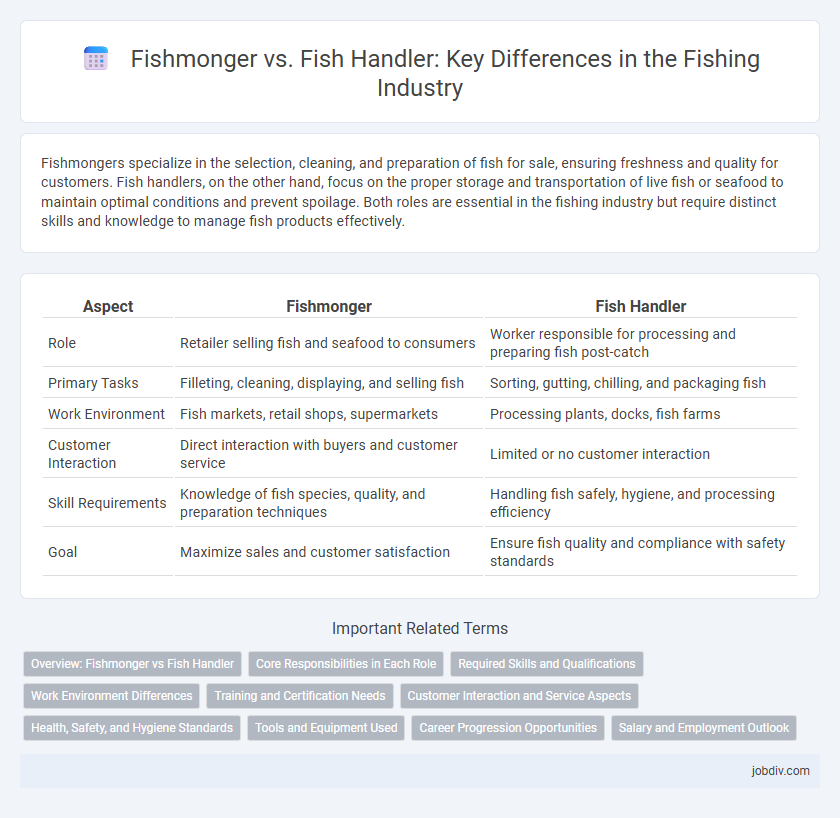Fishmongers specialize in the selection, cleaning, and preparation of fish for sale, ensuring freshness and quality for customers. Fish handlers, on the other hand, focus on the proper storage and transportation of live fish or seafood to maintain optimal conditions and prevent spoilage. Both roles are essential in the fishing industry but require distinct skills and knowledge to manage fish products effectively.
Table of Comparison
| Aspect | Fishmonger | Fish Handler |
|---|---|---|
| Role | Retailer selling fish and seafood to consumers | Worker responsible for processing and preparing fish post-catch |
| Primary Tasks | Filleting, cleaning, displaying, and selling fish | Sorting, gutting, chilling, and packaging fish |
| Work Environment | Fish markets, retail shops, supermarkets | Processing plants, docks, fish farms |
| Customer Interaction | Direct interaction with buyers and customer service | Limited or no customer interaction |
| Skill Requirements | Knowledge of fish species, quality, and preparation techniques | Handling fish safely, hygiene, and processing efficiency |
| Goal | Maximize sales and customer satisfaction | Ensure fish quality and compliance with safety standards |
Overview: Fishmonger vs Fish Handler
A fishmonger specializes in the retail sale and preparation of fish and seafood, often working directly with customers to provide fresh products and expert advice. A fish handler, meanwhile, focuses primarily on the safe handling, processing, and storage of fish to maintain quality and hygiene before reaching the market. Understanding these roles highlights the fishmonger's customer-facing expertise versus the fish handler's operational and quality control responsibilities.
Core Responsibilities in Each Role
Fishmongers specialize in the preparation, presentation, and sale of fresh fish and seafood, ensuring quality and freshness for customers. Fish handlers focus primarily on the safe processing, storage, and transportation of fish to maintain hygiene standards and prevent spoilage. Both roles require knowledge of fish species, but fishmongers interact directly with consumers while fish handlers manage behind-the-scenes operations.
Required Skills and Qualifications
Fishmongers require extensive knowledge of seafood varieties, expert knife skills for filleting and portioning, and strong customer service abilities to advise buyers effectively. Fish handlers prioritize hygiene practices, proper storage techniques, and compliance with food safety regulations to maintain product quality and prevent contamination. Both roles demand physical stamina and familiarity with cold chain management, but fishmongers typically need more sales acumen while handlers focus on operational skills.
Work Environment Differences
Fishmongers typically work in retail environments such as markets and seafood stores, where they handle customer service, display fish for sale, and ensure product freshness. Fish handlers usually operate behind the scenes in processing plants or on fishing vessels, focusing on cleaning, gutting, and packaging fish under strict hygiene standards. The retail setting demands more direct customer interaction, while fish handlers work in more industrial and physically demanding conditions.
Training and Certification Needs
Fishmongers require specialized training in seafood handling, quality assessment, and customer service, often obtaining certifications in food safety and hygiene such as ServSafe or equivalent local standards. Fish handlers focus on the proper handling, storage, and transportation of fish to maintain freshness, with mandatory certifications typically emphasizing safe food practices and cold chain management. Both roles demand compliance with regulatory certifications, but fishmongers receive more extensive training related to product knowledge and retail skills.
Customer Interaction and Service Aspects
Fishmongers specialize in customer interaction, providing personalized service by recommending fresh seafood and preparing fish according to customer preferences, enhancing the shopping experience. Fish handlers primarily focus on the safe and hygienic processing, storage, and transportation of fish, ensuring quality but with limited direct customer engagement. The detailed knowledge fishmongers offer creates a more tailored and informative service compared to the operational role of fish handlers.
Health, Safety, and Hygiene Standards
Fishmongers and fish handlers both play crucial roles in maintaining health, safety, and hygiene standards within the fishing industry. Fishmongers are responsible for preparing, displaying, and selling fish while ensuring compliance with sanitation protocols, temperature control, and contamination prevention to protect consumer health. Fish handlers focus on the initial stages of fish processing, including proper storage, handling, and cleaning practices that adhere to food safety regulations to minimize spoilage and bacterial growth.
Tools and Equipment Used
Fishmongers primarily use specialized knives, scales, and display tanks to prepare and present fresh seafood for retail, ensuring cleanliness and customer appeal. Fish handlers focus on equipment such as insulated containers, gloves, and temperature-controlled storage to maintain freshness and prevent contamination during transport and processing. Both roles require tools designed to uphold hygiene standards and optimize the seafood supply chain.
Career Progression Opportunities
Fishmongers often have greater career progression opportunities due to their direct interaction with customers, sales expertise, and knowledge of seafood varieties, enabling them to advance into managerial or retail ownership roles. Fish handlers typically focus on processing and quality control within supply chains, with career growth primarily available in specialized areas such as food safety inspection or logistics supervision. Mastery of product knowledge and customer service skills distinguishes fishmongers, while technical proficiency and compliance knowledge define the career pathways for fish handlers.
Salary and Employment Outlook
Fishmongers typically earn between $25,000 and $45,000 annually, with wages varying by location and experience, while fish handlers often have lower entry-level salaries ranging from $20,000 to $35,000. Employment outlook for fishmongers is stable, driven by consistent consumer demand for fresh seafood, whereas fish handlers face moderate growth linked to processing and distribution industry expansions. Both roles require specialized skills, but fishmongers often benefit from retail experience and customer interaction, influencing potential salary increases and job stability.
Fishmonger vs Fish Handler Infographic

 jobdiv.com
jobdiv.com